

Les entreprises sociales tirent profit de la loi sur l'ESS. La science est-elle mûre pour la voiture à la tomate. Climate change wins precarious slot in proposed development goals. Labourers plant saplings in a paddy field on the outskirts of the eastern Indian city of Bhubaneswar on July 19, 2014.
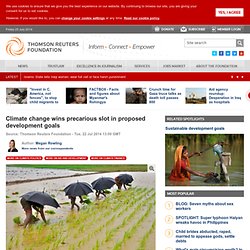
REUTERS/Stringer LONDON (Thomson Reuters Foundation) - Proposed new global development goals, drafted by a U.N. working group, include a goal to take urgent action on climate change, despite opposition from some countries - even though the goal is weaker than many campaigners would like. How the “post-2015 development agenda” – which will follow the expiring Millennium Development Goals – should approach climate change has been a thorny issue for the past 18 months, not least because the world is simultaneously trying to hammer out a new deal to curb greenhouse gas emissions by the end of next year.
Some governments, including the fast-developing economies of Brazil and India, have insisted the development goals should not interfere with U.N. climate talks. "I am quite surprised it is still in there," she said of the climate goal. #TicketForChange : 10 jours à travers la France pour l'entrepreneuriat social de demain. Ticket for Change est une « grande aventure » qui débutera le 26 août prochain avec un voyage de 10 jours à travers la France avec 50 jeunes sélectionnés.
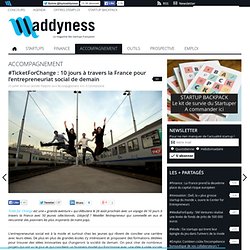
L’objectif ? Réveiller l’entrepreneur qui sommeille en eux et rencontrer des pionniers les plus inspirants de notre pays. L’entrepreneuriat social est à la mode et surtout chez les jeunes qui rêvent de concilier une carrière avec leurs idées. De plus en plus de grandes écoles s’y intéressent et proposent des formations dédiées pour trouver des idées innovantes qui changeront la société de demain. On peut citer de nombreux projets qui ont vu le jour et qui concilient un business model qui fonctionne avec une idée à visée sociale : Kawaa, une strartup sociale qui a pour ambition de favoriser les rencontres un peu partout en France ou encore Zéro Gâchis pour lutter contre le gaspillage alimentaire. Open innovation: quand les entreprises innovent grâce aux idées de leurs clients. Pourquoi se limiter aux cerveaux de son entreprise pour innover, quand on peut en faire participer des milliers d’autres?
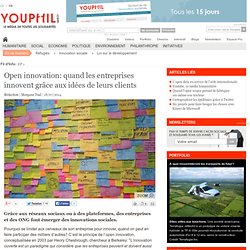
C’est le principe de l’open innovation, conceptualisée en 2003 par Henry Chesbrough, chercheur à Berkeley: "L’innovation ouverte est un paradigme qui considère que les entreprises peuvent et doivent aussi bien utiliser des idées internes qu’externes. " Depuis quelques années, des entreprises travaillent donc en collaboration avec des centres de recherche, des associations, des collectivités, de simples citoyens et même parfois leurs concurrents pour inventer autrement. Les nouvelles technologies facilitent grandement ce processus, en mettant à disposition des outils pour échanger efficacement. [Portfolio] Douze initiatives qui font avancer le monde. Ils innovent, font avancer le monde, et ce, sans forcément beaucoup de moyens.
![[Portfolio] Douze initiatives qui font avancer le monde](http://cdn.pearltrees.com/s/pic/th/portfolio-initiatives-avancer-89526742)
Leurs histoires sont variées, leurs projets aussi. Femmes, hommes, jeunes, moins jeunes, chimiste, agriculteur… Ils viennent du monde universitaire, médical ou rural. Leur objectif? Changer le monde! We cannot give a woman a cow and expect her to change the world. The UK government and Unicef, the UN children's agency, hosted the world's first Girl Summit in London this week to drum up support for a campaign to end child marriage and female genital mutilation (FGM), practices affecting millions of girls around the globe.
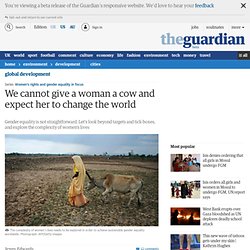
Working with communities to eradicate these practices is an important step towards gender parity. However, the focus on investing in girls to bring worldwide benefits – which has become increasingly popular among donors, NGOs and private-sector supporters – is a concern. Quick fixes are rarely the answer to complex and intertwined problems such as access to decent work, education and securing legal rights. The analogy used within the Pathways of Women's Empowerment programme, an international research initiative that aims to bring about positive change to women's lives, is that agencies are building motorways to nowhere. Surveys conducted in Bangladesh and Egypt highlight the cultural differences between women. Challenges lying ahead for impact investing. By Vishal Mehta, Cofounder & MD Lok Capital Having started as an impetus for microfinance nearly a decade ago, impact investing today influences a wide array of sectors and supports innovative business models.
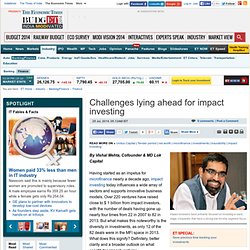
Over 220 ventures have raised close to $ 1 billion from impact investors, with the number of deals having gone up nearly four times from 22 in 2007 to 82 in 2013. But what makes this noteworthy is the diversity in investments, as only 12 of the 82 deals were in the MFI space in 2013. What does this signify? Definitely, better clarity and a broader outlook on what constitutes impact ventures.
Impact investors have primarily focused on investing in early stage companies that have a strong low income segment focus. Take Lok's portfolio company, Everest Edusys for instance, it is not exclusively focused on the public schools or the low income segment, but also works with private schools in a bid to impact learning outcomes across the entire school education spectrum.